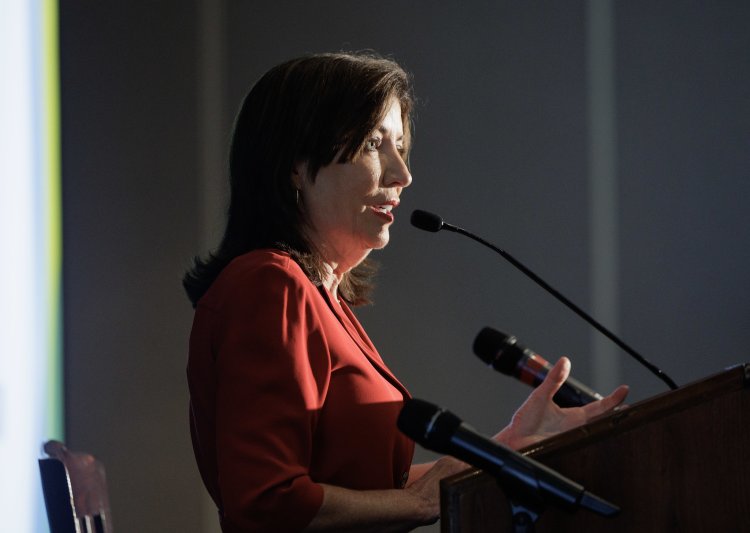Pressured by Trump, blue states respond by pressuring utilities
Democratic lawmakers are advocating for restrictions on utility profits in response to voter concerns about affordability, while also aiming to counter criticism regarding the expenses associated with clean energy policies.

Under pressure from high energy prices coupled with Republican scrutiny, they're proposing measures across states from New York to California aimed at capping the earnings of investors involved in gas and electric utilities. The goal is to counteract claims like Trump's recent executive order that attributes high energy costs to the clean energy policies of blue states, as well as to potentially reduce consumer bills.
“When you knock on thousands of doors, you start to hear a theme, and the theme was, 'I don't know how I'm going to pay my utility bills,'” said Rhode Island state Rep. Megan Cotter, a Democrat representing a district that Trump won in November.
Before Trump's return to office, Democrats were already contending with soaring energy prices. Nationwide, electricity bills climbed by 3 percent from January 2024 to January 2025, but increases exceeded 11 percent in New York, New Jersey, and Connecticut, according to the U.S. Energy Information Administration.
These escalating costs have put Democratic lawmakers and governors on the defensive, leading them to critique utilities and power grid operators while facing Republican opposition and criticism of their clean energy objectives, the expenses of which are beginning to appear on consumer bills. Proponents of transitioning to renewable energy and electrification argue that such changes will ultimately protect U.S. residents from volatile fossil fuel price fluctuations, contributing to cleaner air and reduced greenhouse gas emissions. However, as Democrats promise significant shifts in the energy landscape, they must ensure voters do not perceive the move away from fossil fuels as excessively costly in the immediate future.
“If the Democrats, who are in the majority, don't do anything about these electric bills, it may end up falling in their lap,” contended Connecticut House Minority Leader Vincent Candelora, a Republican.
Utility executives are pushing back against attempts to cap their profits, claiming that these measures could stifle investment in the power grid and lead to higher overall rates.
"It hurts our credit worthiness," said Southern California Edison President and CEO Steve Powell. "Our costs go up. And then ultimately, customers end up paying for that."
In January, Cotter proposed legislation to cap utilities' "return on equity"—a critical financial indicator for utility firms determining shareholder earnings—at 4 percent, significantly lower than the industry average of 9.7 percent projected for 2024.
Similar proposals in New York, California, and New Jersey aim to restrict utility profits. New York Sen. James Skoufis' February proposal suggests a 4 percent cap, mirroring Cotter's bill, while New Jersey Assemblymember Eliana Pintor Marin introduced legislation last month focusing on ensuring utilities receive the “lowest reasonable return.”
In California, where electricity rates are nearly double the national average, Assemblymember Cottie Petrie-Norris is requesting that the Public Utilities Commission deny utilities’ requests for a 1 percent increase in returns on equity, which would boost shareholder profits to over 11 percent.
“Asking to increase it is just totally unacceptable, and honestly, a failure to read the room," Petrie-Norris noted.
However, interest in limiting utility profits is not exclusive to Democrats. Republican Sen. Don Gaetz of Florida, the father of former House Rep. Matt Gaetz, has also introduced a bill to restrict the return on equity to a “risk-free rate of return,” aligned with extremely low-risk investments like U.S. Treasury bonds.
“Increasingly I have constituents saying to me, 'Why are we paying the rates we are paying?'" Gaetz stated in an interview when he introduced the bill in January, as Florida Power & Light Co. was getting ready to request a rate hike of 2.5 percent annually over the next four years.
Democratic governors are also voicing concerns.
Connecticut Gov. Ned Lamont expressed that he was “mad as hell” about the spike in summer utility bills. California Gov. Gavin Newsom directed regulators last fall to eliminate underperforming energy efficiency programs and maximize credits for consumers from the state’s cap-and-trade initiatives. Similarly, Massachusetts Gov. Maura Healey instructed gas utilities last month to cut costs immediately, announced a plan to refund millions collected for clean energy programs, and promised to enact legislation limiting future rate increases.
Earlier this year, New York Gov. Kathy Hochul criticized Con Edison, the state’s largest utility, for proposing double-digit increases in gas and electricity rates. She demanded that the company revisit its proposal, which Con Ed refused to do.
Con Ed is seeking to raise its return on equity from the current 9.25 percent to 10.1 percent.
“Shocking,” Hochul remarked about Con Ed’s proposed rate increase. “This is intolerable to me."
Con Ed representatives argue that substantial investments are necessary to accommodate more electric vehicles and heat pumps, as driven by city and state policies.
“We work with our regulator and other stakeholders to arrive at a rate of return that balances our need to attract investors with our need to keep rates affordable, especially for low- and moderate-income customers,” stated Jamie McShane, a spokesperson for Con Ed. “An adequate ROE allows us to invest in our energy systems and keep them safe and reliable.”
State-appointed ratepayer advocates, who collaborate with regulators to manage costs, have long championed lower returns. However, the newfound attention from elected officials is significant.
“It’s always an issue in our little world,” noted Brian Lipman, head of New Jersey’s Division of Rate Counsel. “It’s the first time I’ve seen it come outside the utility world and other people paying attention to it.”
The effectiveness of these proposals in actually lowering bills remains uncertain. In theory, lower return on equity should result in reduced utility costs and, consequently, lower consumer bills. However, curtailing utilities' returns risks diminishing their bond ratings and raising their debt financing costs, as noted by utilities, analysts, and some state regulators.
Utility representatives contend that caps proposed in Rhode Island and New York would offer little incentive to invest in maintaining the essential infrastructure needed for delivering gas and electricity, ultimately resulting in increased costs for customers over time.
“Lower credit ratings will impact the cost and availability of debt capital, and over the long term is likely to require much higher overall rates of return, which would need to be recovered from customers through higher utility rates,” explained Brian Welsch, vice president of rates and regulatory affairs at New York gas utility National Fuel.
Conversely, some experts believe that while a 4 percent return in Rhode Island may be excessively low, the proposal is a step in the right direction.
“It draws attention to the problem that current authorized ROEs are way too high," commented Mark Ellis, former chief economist and chief of corporate strategy at Sempra Energy, who now advocates for lower utility returns nationwide to help bring down consumer bills. "The utilities have been overcharging customers for decades."
In a report for the American Economic Liberties Project, Ellis argues that utilities have consistently overcharged the public, seeking double-digit returns when they should realistically be earning under 6.7 percent due to lower investment risks inherent to utilities.
Given the current market volatility and declining stock values, additional pressure to lower utility returns may emerge. New Jersey’s ratepayer advocate has indicated plans to advocate for reduced returns in ongoing rate cases based on the "current environment."
Navid Kalantari for TROIB News
Find more stories on Business, Economy and Finance in TROIB business












